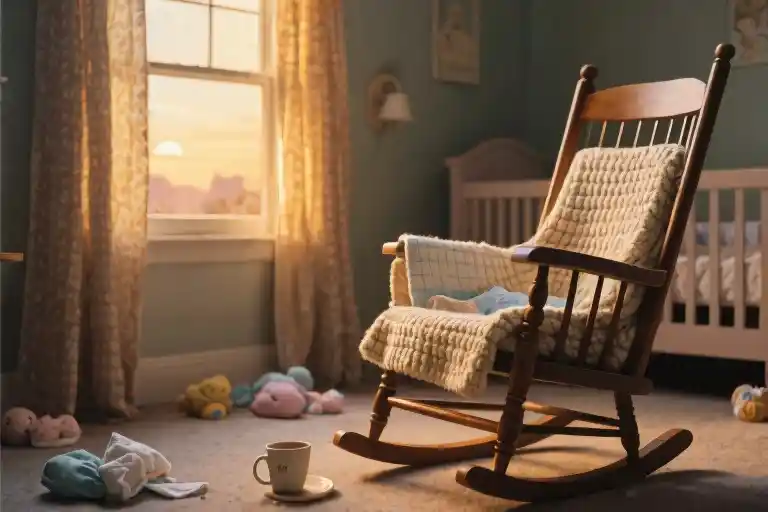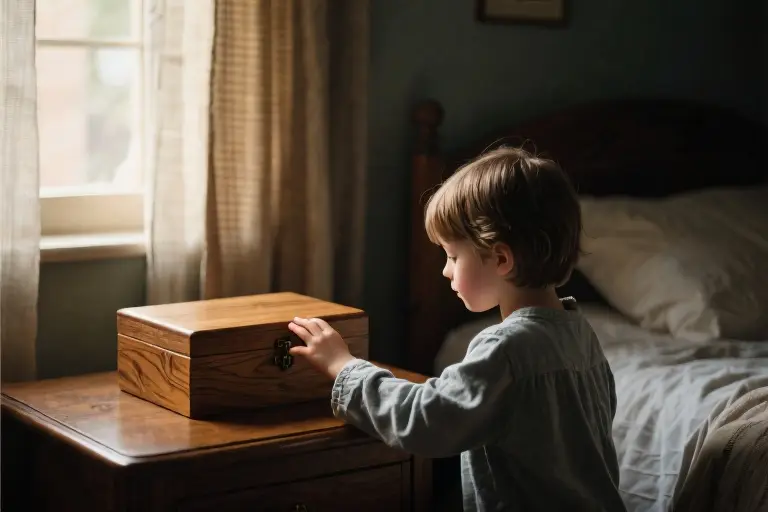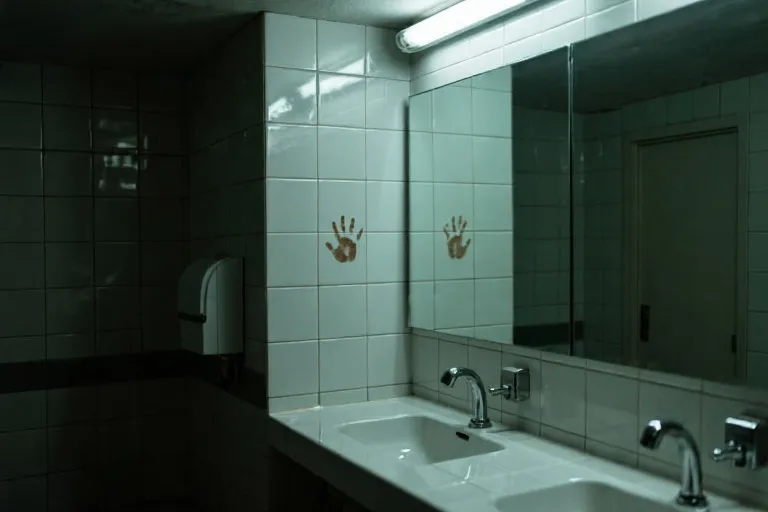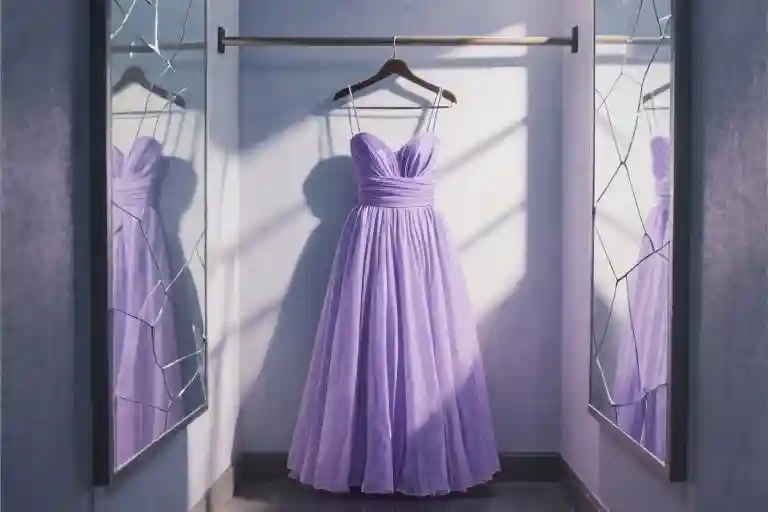The hallway stretches like a tired muscle, its length measured in shuffling steps—back and forth, back and forth. A pendulum of exhaustion marking time between the overflowing sink and the mountain of laundry that’s taken root near the radiator. Each pass reveals new casualties of this war: a cereal bowl with milk skin forming, tiny socks hiding like landmines in the carpet pile.
Three months ago, these walls held space differently. The kitchen island was for wine glasses and cookbooks, not a staging ground for sterilized bottles. Now every surface buckles under the weight of survival gear—nipple shields, burp cloths, a half-empty tube of lanolin crushed like a spent toothpaste.
Somewhere beneath the stickiness of unwashed hair and the sour-milk scent clinging to her shirt, there’s a woman screaming. You can hear her in the way fingers twitch toward the untouched novel on the nightstand, in the aborted glance at the front door when the baby finally latches. She rattles the bars of her ribcage prison with fantasies of scalding showers and uninterrupted sleep, of existing as someone whose body isn’t constantly borrowed.
The baby stiffens against her chest, that warning tremble before the storm. Red-faced and furious, this tiny dictator whose needs eclipse all others. The weight pulls her spine into a question mark shape, one hand bracing against her lower back as if she could physically hold herself together.
Outside, a neighbor’s sprinkler system ticks on. The sound syncs with the rocking rhythm—back and forth, back and forth—until time dissolves into the primal algebra of need meeting exhaustion. Somewhere beyond the fog, a phone buzzes with well-meaning texts: How’s motherhood treating you? The screen stays dark
Body in Revolt: The Postpartum Uprising
The stretch marks aren’t just lines on skin – they’re fault lines where my old life fractured. Each silvery streak maps the tectonic shifts of motherhood, the continental plates of identity colliding and separating. I trace them in the bathroom mirror while the baby naps (or doesn’t), these strange topographical reminders that my body no longer belongs to me.
Then there’s the betrayal of pelvic floors. That moment mid-laugh when muscles I never knew existed suddenly go rogue – a humiliating reminder that childbirth isn’t really over. The medical brochures called it “light stress incontinence” like it’s some delicate condition, but there’s nothing light about sprinting to the bathroom while your bladder mocks your newfound vulnerability.
The hormones are their own special warfare. One minute I’m marveling at tiny fingernails, the next I’m sobbing because the grocery store ran out of my preferred lactation cookies. Cortisol and oxytocin wage chemical battles in my bloodstream, turning moods into minefields. Scientists say postpartum hormone fluctuations rival adolescence – except teenagers don’t have to keep another human alive while riding this biochemical rollercoaster.
And the smells. God, the smells. Rancid milk and unwashed hair and sweat with some new alien musk. My nose has become a relentless truth-teller, broadcasting my physical reality without consent. The scents mark time in ways clocks no longer can: three hours since last nursing means slightly less breast leakage, four days without showering means the dry shampoo’s losing its battle.
This body used to be mine. Now it’s a rental property with questionable plumbing and unreliable heating, occupied by a tiny dictator whose demands come in two-hour increments. The mirror shows a stranger with my face – softer jawline from water retention, darker circles under eyes that have seen too many 3AM feedings. When did I become someone who wears stained sweatpants to the mailbox?
Yet in stolen moments, I’m learning to read this new terrain. The stretch marks glow pearly in morning light, evidence of what these cells endured and created. The leaky bladder means I finally do those Kegels the pregnancy apps nagged about. Even the hormonal tsunamis bring unexpected gifts – tears that release pressure, laughter that bubbles up uncontrollably during midnight diaper changes.
This body isn’t broken. It’s rewriting its operating manual page by painful page. The chapters on autonomy and dignity are being revised, but the story isn’t over. Somewhere beneath the milk stains and exhaustion, a new woman is being assembled – piece by mismatched piece.
Time Deconstructed
The clock no longer ticks in hours but in three-hour increments between feedings. This is how time moves now – not by the sun’s arc across the sky, but by the insistent rooting against your collarbone, the wet gulp of a tiny throat working. You develop a sixth sense for when exactly 178 minutes have elapsed since the last session, your breasts becoming living hourglasses that ache when the sand runs low.
Amazon boxes stack like sedimentary layers in the hallway, each stratum marking developmental epochs: Size 1 diapers give way to 2s, swaddles yield to sleep sacks, nipple shields disappear beneath teething toys. These cardboard monuments to survival mode tell a more honest story than the milestone cards propped beside the bassinet. The shipping labels form an accidental diary: 3am wipes subscription followed by lactation cookies bulk order reads like a haiku of desperation.
Your phone’s camera roll becomes a distorted mirror. Between the soft-focus portraits where you’ve managed to brush your hair exists the truth in the outtakes: the 4:17am selfie capturing dark crescents beneath your eyes, the accidental swipe revealing yesterday’s screenshot of “when do newborns sleep through night?” search results. These digital breadcrumbs trace the widening gap between the mother you present and the one who counts minutes until naptime.
Sleep debt compounds at loan-shark rates. That first night home from the hospital when you foolishly thought “just two more hours” would restore you now seems quaint. The deficit grows exponentially – each interrupted REM cycle adding interest to a balance that will take years to repay, if ever. You develop superstitions: if you check the monitor exactly three times before lying down, maybe this will be the stretch where sleep comes uninterrupted for longer than 57 minutes.
In this new chronology, productivity metrics become absurd. Loading the dishwasher between cries counts as a major accomplishment. Showering with the door unlocked qualifies as self-care. You measure achievement in milliliters expressed and ounces gained, in the miraculous 22-minute stretch where the baby dozed against your chest while you drank tea that stayed warm past the third sip.
The world outside still operates on Greenwich Mean Time, oblivious to your private time zone where meetings get scheduled during nap windows and well-meaning texts ask “sleeping better?” as if it’s a simple toggle switch. You learn to translate: “Let’s catch up soon” means sometime after the 4-month sleep regression, “just a quick call” requires at least 48 hours notice to coordinate with the unpredictable nap gods.
Somewhere beneath the sleep deprivation, you recognize this as chronological hazing – the brutal initiation into motherhood’s secret society where time bends to the will of something smaller than a loaf of bread. The knowledge that this too shall pass offers cold comfort when you’re watching sunrise for the third night running, but the pediatrician’s chart does show the feeding intervals gradually, imperceptibly lengthening.
One Tuesday afternoon, you’ll suddenly realize two remarkable things: the baby has been asleep in the crib for 73 consecutive minutes, and you can’t remember the last time you checked the clock. This is how the new normal begins – not with fanfare, but with the quiet realization that you’ve started measuring time in something other than ounces and hours.
The Performance Costume of Motherhood
The Instagram grid stares back at me – nine perfect squares of pastel bliss. A sleeping newborn curled like a comma, milk-drunk lips glistening. My thumb hovers over the ‘post’ button, index finger twitching to apply the ‘Soft Glow’ filter that erases the purple crescents under my eyes. This is the third take; the first two showed spit-up stains on my nursing tank.
Social media motherhood operates on theater rules: heavy stage makeup, carefully blocked movements, scripted captions. We perform between feedings, our real lives existing in the outtakes – the shaky footage where the baby wails off-camera while we whisper-scream “Just let me get one good picture!” The algorithm rewards sacrifice porn: martyred mothers glowing with exhaustion, their suffering aestheticized into pastel infographics about “the hardest job in the world.”
The Violence of Nostalgia
“We never used those fancy diaper creams,” my mother-in-law announces, watching me rub zinc oxide on angry red rash lines. Her voice carries the particular smugness of survivors rewriting history. “Just cornstarch and air. You millennials overcomplicate everything.”
Generational amnesia is a required course in the motherhood curriculum. The women who came before us edit their memories into parables, sanding down the jagged edges of their own postpartum experiences until they become smooth stones to throw at us. Their “we managed just fine” narratives ignore the seismic shifts in parenting expectations – the way mothering has morphed from a communal practice into a competitive individual sport judged by Pinterest boards and developmental milestone spreadsheets.
The Phantom Limbs of Professional Identity
I find my old work ID badge while digging through the diaper bag for pacifiers. The laminated photo shows a woman with blown-out hair and sharp-angled blazer, her smile calibrated to convey “approachable competence.” That woman seems as distant to me now as a childhood friend whose face I can barely recall.
The pumping bra I wear under stained sweatshirts has more in common with tactical gear than lingerie – a utilitarian harness for extracting liquid gold between Zoom calls where I strategically angle the camera to hide the milky leakage spreading across my blouse. Corporate America tolerates motherhood as long as it remains discreet, as long as we pretend the baby waiting in daycare doesn’t exist between 9 to 5.
The Stockholm Syndrome of Maternal Love
Here’s the uncomfortable truth no baby shower card mentions: sometimes I hate this. In the 3AM darkness, when tiny fists pummel my collarbone for the fifth feeding of the night, resentment rises like bile. Then dawn comes, and her gummy smile triggers a dopamine rush so potent it overwrites the exhaustion. This is the cruel brilliance of evolution – it makes us addicts to the very thing that’s dismantling us.
We call it “unconditional love” when really it’s a sophisticated hostage situation. The baby holds your former self at gunpoint, demanding you relinquish sleep, autonomy, and brain cells in exchange for occasional hits of oxytocin. And like any good captive, you start identifying with your captor, defending the system that binds you. “She needs me” becomes both prison and purpose.
The cage isn’t just physical – it’s the mental bars we reinforce every time we say “I’m fine” through clenched teeth, every time we delete the raw caption and replace it with #blessed. Real freedom begins when we stop pretending the lock doesn’t exist.
The Light Catcher’s Manifesto
In the debris of sleepless nights and unwashed hair, we become archaeologists of joy. The poetry of survival isn’t written in leather-bound journals but on the back of grocery receipts during stolen bathroom minutes. That haiku about nipple cream? A revolutionary act.
Bathroom Poetry Resistance
The lock clicks for 300 seconds – not enough to shower but sufficient to scribble:
“Milk stains on silk blouse / the meeting starts in ten / pump or perish”
These microfractures in maternal martyrdom matter. The CDC won’t track how many postpartum breakdowns were prevented by writing bad limericks about episiotomies, but we know. Our phones fill with voice memos of half-formed thoughts interrupted by wails, each pause a caesura in the epic poem we didn’t consent to write.
Dopamine Deposit Slips
Then it happens – not the textbook “social smile” at 6 weeks, but the real one. That gummy, slightly asymmetrical grin when they recognize your sleep-deprived face as their personal sun. Neuroscientists measure it as 25 IU of endogenous opioids, but you’ll feel it as the first interest payment on your emotional bankruptcy.
Track these moments like a Wall Street trader:
- 07:32: Baby giggles at ceiling fan (NASDAQ: HOPE ↑12%)
- 14:17: Napped through trash truck (DOW: SANITY +13pts)
Hormonal Stock Market
Week six brings the first downward trend on your cortisol chart. The jagged peaks of early postpartum begin smoothing into rolling hills. You notice the change in mundane victories – folding a onesie without weeping, drinking coffee while it’s still warm. Progesterone stops its hostile takeover bid as estrogen negotiates a coalition government with your neurotransmitters.
This isn’t linear progress. There will be flash crashes when growth spurts hit or vaccines are due. But the overall trajectory whispers: This too shall pass in the clinical language of diurnal cortisol slopes.
Cage Door Ajar
The iron bars begin oxidizing. Sunlight penetrates in unexpected moments – when the baby naps long enough for you to notice birdsong, when their tiny hand grips your pinky with primate trust. The imprisoned woman stops rattling bars and starts humming off-key lullabies.
These fragments of light don’t solve the sleep deprivation calculus or magically restock the dishwasher. But they form a counter-narrative to the martyrdom mythology, proof that you’re not just surviving but occasionally, fleetingly, rewriting the script.
The revolution will not be pediatrician-approved, but it will be televised on your private Instagram stories at 3am.
The Coda of Dawn
The baby’s cry cuts through the predawn silence like a jagged piece of glass. Somewhere beyond the fogged window, a mockingbird begins its morning recital – two distinct melodies now weaving through the same exhausted air. Back and forth they go, these competing symphonies, just as my bare feet have worn paths across the warped floorboards these past eleven weeks.
A thin line of light appears where the curtain doesn’t quite meet the wall. It falls across the makeshift nursery (really just a corner of our bedroom) and illuminates particles of dust suspended in midair. For a fleeting moment, they resemble the snow globe my sister sent last Christmas, back when I still had the luxury of finding kitsch charming. The light creeps forward until it touches the bars of the bassinet – those slender white rods that suddenly look less like protection and more like the ribcage of some enormous creature.
My fingers find the chipped paint where I’ve gripped this crib during midnight feedings. The rust stains under my nails could almost pass for autumn leaves pressed between book pages, if one were feeling poetic. Which I’m not. Not at 4:17am with my left breast leaking and yesterday’s spit-up crusted in my hair.
Yet something shifts when the bird launches into its second verse. The woman inside the iron bars (who screamed so violently last night when the pediatrician’s after-hours number went to voicemail) grows quiet. Not gone, never gone, but listening. Her matted hair catches the advancing light as she presses her forehead against the cold metal. Outside, the mockingbird imitates a car alarm with unsettling accuracy.
I reach for the baby without thinking, muscle memory overriding bone-deep fatigue. Her tiny body stiffens against my collarbone, then relaxes into the familiar hollow between my ribs. My free hand drifts to the windowsill where the dawn has begun its slow alchemy – turning the rust on the fire escape from dried blood to copper to gold.
We sway there, the three of us: the bird with its stolen songs, the baby with her fists curled like sea anemones, and whatever’s left of me beneath the milk stains and cortisol. My lips part and something emerges that might be a lullaby or might just be the ghost of a college radio jingle. It doesn’t matter that the tune fractures on the high notes, or that the words dissolve into nonsense syllables by the second line.
What matters is this: the iron bars feel slightly warmer to the touch. The woman behind them has stopped shaking them for the first time in weeks. And when the baby’s eyelids finally flutter closed, they stay that way for a full seven minutes – which is practically an eternity in newborn time.
The mockingbird switches to mimicking a cell phone ringtone. Somewhere downstairs, the coffee maker I forgot to program last night remains stubbornly silent. There are still dishes in the sink and unpaid bills on the counter and a suspicious stain on the ceiling that might be mold. But for these few stolen moments, as the light works its way across the room, the cage door creaks open just wide enough to let hope slip inside.





